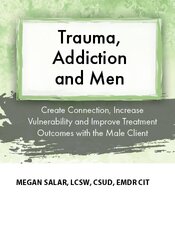

Don’t be weak, don’t ask for help, don’t cry, don’t show emotion.
These damaging expectations of masculinity are ruining your sessions, causing many male clients to bottle up the shame of past traumas, struggle to be vulnerable and open in therapy, and labour to leave emotion numbing drugs behind.
It can make therapeutic progress seem impossible and leave you frustrated, questioning your competence, and feeling powerless when nothing you try seems to work.
Treat male clients with trauma and addiction issues more effectively than ever before!
No matter your own gender, this essential recording will give you exactly what you need to:
Experience new levels of therapeutic success with the guidance and tailored approaches you need to meet the needs of men in therapy!
This online program is worth 5.5 hours CPD.
| File type | File name | Number of pages | |
|---|---|---|---|
| Manual - Trauma, Addiction and Men (12.68 MB) | 39 Pages | Available after Purchase |

Megan Salar, LCSW, ACADC, CCTP-II, EMDR-C, is an Evergreen certified EMDR clinician and trainer, as well as a Certified Clinical Trauma Professional II through Evergreen Certifications. Megan is also an Advanced Certified Alcohol and Drug Counselor, who formerly owned and operated one of the largest treatment centers for substance abuse and trauma in Southeast Idaho, which was voted best in practice for 2019.
Her trainings have helped thousands of clinicians across the US get the most of EMDR, trauma and addiction-based skills and practices. She has been invited to train internationally at the International Society of Addiction Medicine in India, the International Conference on Addiction Research and Therapy in Amsterdam and at the Psicologia Institute of Italy. Megan has extensively been trained on the use of EMDR as a protocol and uses EMDR in her practice to achieve improved outcomes with a broad spectrum of clients in the areas of trauma, abuse, attachment and substance abuse. She is an expert witness at the State and Federal level for her expertise in areas surrounding trauma.
Megan is the author of EMDR Workbook for Trauma and PTSD: Skills to Manage Triggers, Move Beyond Traumatic Memories, and Take Back Your Life set to be released by New Harbinger Publications in 2023. She earned her master’s in Clinical Social Work from Northwest Nazarene University in 2011 and is an active member of the International Society of Addiction Medicine and the National Association of Social Workers. She currently owns and operates her own Counseling, Consulting and Training Business and is passionate about genuinely changing the landscape of trauma treatment through an authentic, hands-on perspective that she has uniquely made her own.
Male Gender Roles and Stereotypes: Understand What Drives the Behaviour
Identify the Root of Trauma and Addiction in Men: Understand the Research and Effective Assessment
Open Male Clients to Vulnerability and Change: Clinical Interventions to Overcome Male Shame and Stigma
Therapeutic Adjustments for Men Who Struggle with “Talk Therapy”: 5 Techniques to Get Off on the Right Foot and Keep Men in Treatment
Other Treatment Roadblocks: Solutions for Common Concerns When Treating Men
Satisfaction Guarantee
Your satisfaction is our goal and our guarantee. Concerns should be addressed to info@pesi.co.uk or call 01235847393.
Please wait ...